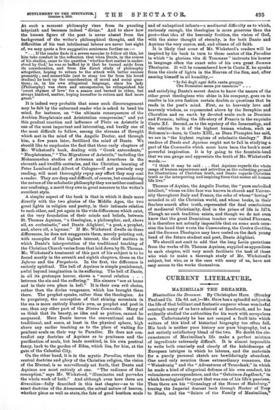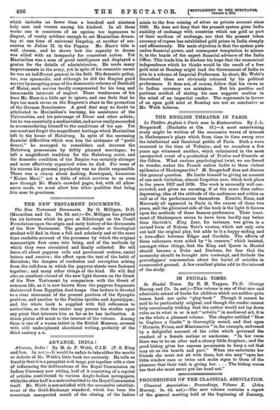CURRENT LITERATURE.
MAXIMILIAN THE DREAMER.
Maximilian the Dreamer. By Christopher Hare. (Stanley Paul and Co. 12s. 6d. net.)—Mr. Hare has a splendid subject in the life of that brilliant and fantastic emperor whose wonderful cenotaph many of us have admired at Innsbruck, and he has evidently studied the authorities for his work with scrupulous care. Unfortunately he has not escaped a fault into which writers of this kind of historical biography too often fall. His book is neither pure history nor pure biography, but a, not entirely satisfactory blend of the two. No doubt the cir- cumstances of Maximilian's life make a perfect mixture of ingredients extremely difficult. It is almost impossible to write both concisely and clearly of the kaleidoscope of European intrigue in which be labours, and the materials for a purely personal sketch are bewilderingly abundant. One need only mention those extraordinary romances, the " Weisskunig " and the "Adventures of Teuerdank," in which he made a kind of allegorical defence of his own conduct, his voluminous correspondence, and the " Gebeimes Jagdbucb," in which be eulogized the sport that was one of his life's passions. Then there are his " Genealogy of the House of Habsburg," tracing the Imperial descent back through Hector of Troy to Noah, and the "Saints of the Family of Maximilian,"
which includes no fewer than a hundred and nineteen holy men and women among his kindred. In all these works one is conscious of an egoism too ingenuous to disgust, of vanity sublime enough to set Maximilian dream- ing at one time of universal kingship, at another of suc- cession to Julius II. in the Papacy. Mr. Hare's title is well chosen, and he shows how the capacity to dream was allied with an incapacity for consistent action. Yet Maximilian was a man of great intelligence and displayed a genius for the details of administration. He made many improvements in the army, yet in spite of his romantic career he was an indifferent general in the field. His domestic policy, too, was spasmodic, and although he did the Empire good service by accepting some of the democratic reforms of Berthold of Mainz, such service hardly compensated for his long and inexcusable intervals of neglect. These weaknesses of his hero Mr. Hare is a little apt to ignore, and one feels that be lays too much stress on the Emperor's share in the promotion of the German Renaissance. A good deal may no doubt be attributed to Maximilian's learning, his assistance of the Universities, and his patronage of Direr and other artists ; but he was essentially a mediaevalist, and never really succeeded in accommodating himself to the conditions of his age. Yet one must not forget the magnificent heritage which Maximilian left to the house of Habsburg. In spite of the unceasing financial difficulties which won him the nickname of " pochi denari," he managed to consolidate and increase the Habsburg possessions by deftly planned marriages; he left a magnificent tradition for the Habsburg court, and the domestic condition of the Empire was certainly stronger and more effectively organized when he died. For some of his success his personal popularity was no doubt responsible. There was a charm about dashing, flamboyant, humorous "Kaiser Maxi," not a little of which survives to us even now through Mr. Hare's crowded pages, but, with all allow- ances made, we must allow him other qualities that bring him near to greatness.



































































 Previous page
Previous page